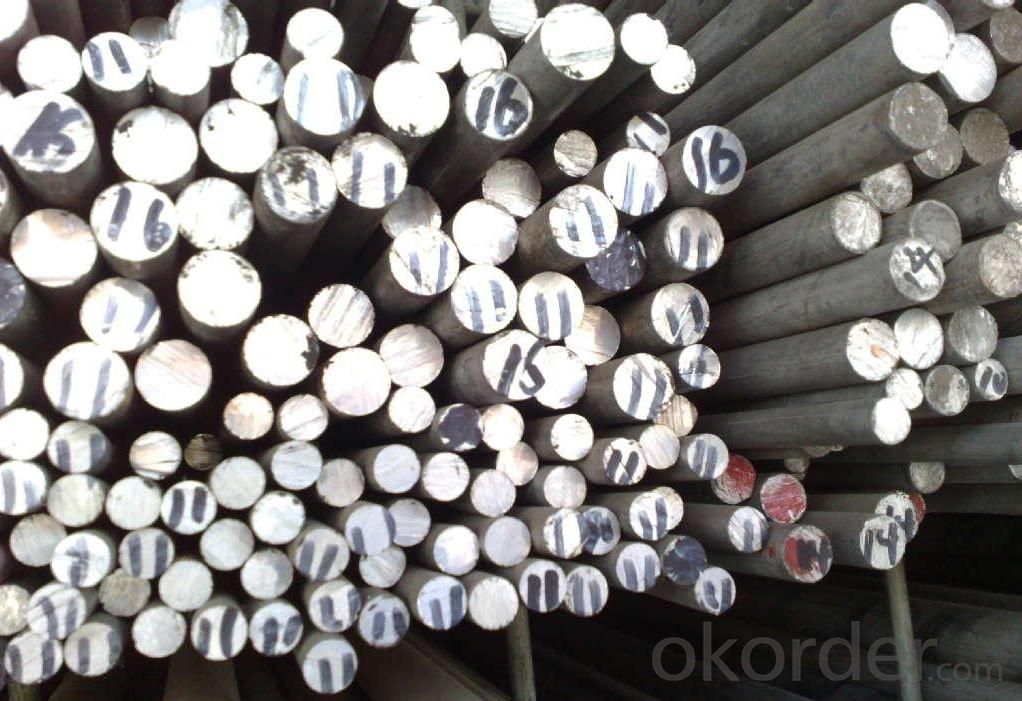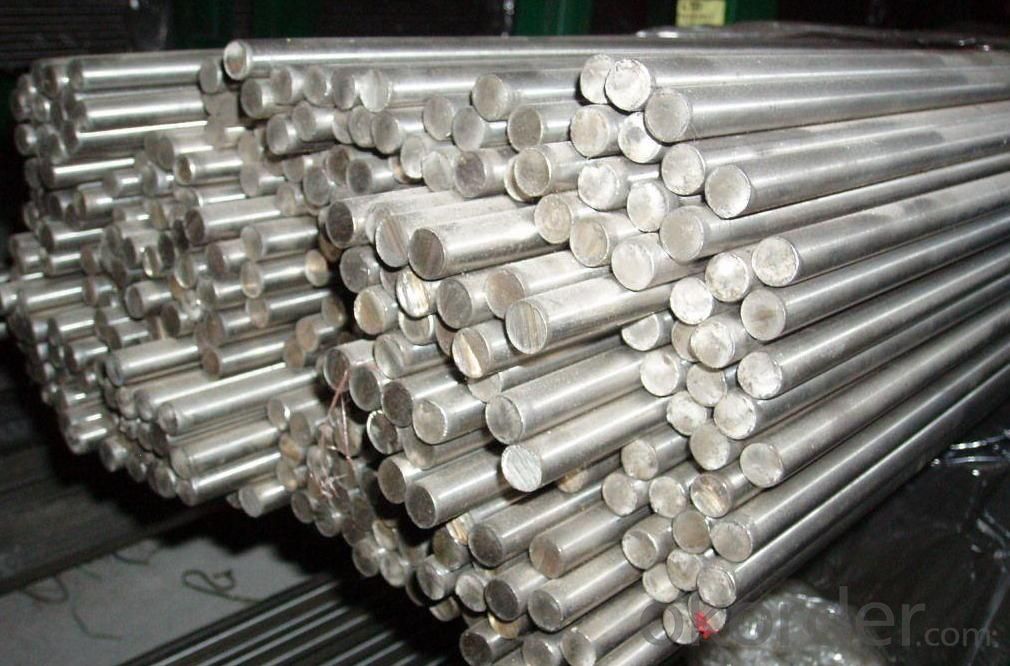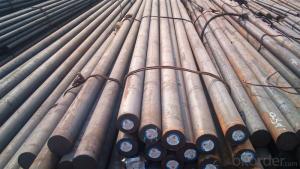ASTM 5140 Alloy Steel Bar Hot Rolled Finished
- Loading Port:
- Tianjin
- Payment Terms:
- TT OR LC
- Min Order Qty:
- 25 m.t.
- Supply Capability:
- 50000 m.t./month
OKorder Service Pledge
OKorder Financial Service
You Might Also Like
Item specifice
ASTM 5140 Alloy Steel Bar Hot Rolled Finished
Product Description:
Item | Alloy steel bar,alloy steel rod,steel bar,steel rod,alloy bar,alloy rod |
Standard | ASTM,AISI,SUS,GB,JIS,DIN |
Material | 10#,15#,20#,A105,1010,1015,1020,1030,S25C,S35V,1035,1050,1060,20Mn, 25Mn,30Mn,40Mn,50Mn,130,20Mn2,30Mn2,35Mn2,15Cr,15CrMo,42CrMo, 42CrMo4,34CrMo4,30CrMo,12CrMo,40Cr,35CrMo,C45,1045,4130,3140,4140, 4145,4137,5115,etc
|
Dimension | Round bar:Diameter:2-1000mm,Length:1-12m,or as required |
Flat bar:thickness:0.3-500mm,Width:2-3000mm,Length:1-12m,or as required | |
Square bar:Diameter:2*2-800*800mm,Length:1-12m | |
Angle bar:width:10*10-500*500mm,Thickness:2-150mm,Length:1-12m | |
Hexagonal bar:Diameter:4-800mm,Length:1-12m,or as required | |
Surface | polished,bright,black,coated,2b,ba,mirror,NO.4,8K |
Treatment | Hot rolled,cold drawn,Forged |
Package | Standard export seaworthy or as customers’ requirements |
Chemical Composition
Item | C | Si | Mn | P ≤ | S ≤ | Cr ≤ | Ni ≤ | Mo ≤ | Cu ≤ | |
GB/T 3077-1999 | 40Cr | 0.37-0.44 | 0.17-0.37 | 0.50-0.80 | 0.035 | 0.80-1.10 | 0.30 | 0.15 | 0.30 | |
Application:
Carbon steel rod applies to chemical industry,shipping industry,
manufacturing industry,construction,decorate industry,electric
power,pump shafts,sanitary wares,furniture handles,boiler,high
temperature resistant,low temperature resistant,corrosion resistant.
Product Show:


- Q:How is special steel used in the production of springs?
- Special steel is used in the production of springs due to its excellent mechanical properties. It provides the necessary strength, durability, and elasticity required for springs to function effectively. The unique composition and heat treatment of special steel enable springs to withstand high levels of stress and repetitive loading, ensuring their longevity and reliability in various applications such as automotive, aerospace, and machinery industries.
- Q:Can special steel be coated?
- Yes, special steel can be coated. Coatings can provide various benefits such as corrosion resistance, improved aesthetics, and enhanced durability to special steel.
- Q:Can special steel be used in aerospace turbine components?
- Yes, special steel can be used in aerospace turbine components. Special steel, also known as high-performance alloy steel, possesses excellent mechanical properties such as high strength, hardness, and temperature resistance. These properties make it suitable for use in aerospace turbine components, which are subjected to extreme conditions such as high temperatures, pressures, and stress. Aerospace turbine components, including blades, vanes, and disks, are critical parts of jet engines that require materials capable of withstanding the harsh operating conditions. Special steel alloys, such as nickel-based superalloys, are commonly used in these applications due to their ability to maintain their strength and integrity at elevated temperatures. Additionally, the high strength-to-weight ratio of special steel allows for the production of lightweight yet durable turbine components, contributing to the overall efficiency and performance of the aerospace systems. Moreover, special steel alloys can also exhibit excellent resistance to corrosion, oxidation, and fatigue, which are crucial factors in the long-term reliability and safety of aerospace turbine components. These materials undergo rigorous testing and certification processes to ensure they meet the stringent standards and requirements set by the aviation industry. In conclusion, special steel is indeed a suitable material for aerospace turbine components due to its exceptional mechanical properties, high temperature resistance, and ability to withstand extreme conditions. It plays a vital role in ensuring the reliability, efficiency, and safety of turbine systems used in aerospace applications.
- Q:What are the different aerospace grades of special steel?
- Some of the different aerospace grades of special steel include 15-5PH, 17-4PH, 300M, 4130, 4340, 440C, and H11. These grades are specifically designed to meet the high-performance requirements of the aerospace industry, providing excellent strength, corrosion resistance, and heat resistance properties.
- Q:What are the different casting methods used for special steel?
- There are several different casting methods that are commonly used for special steel, depending on the specific needs and requirements of the application. These methods include investment casting, sand casting, continuous casting, and centrifugal casting. 1. Investment casting: This method involves creating a wax pattern of the desired part, which is then coated with a ceramic shell. The wax is melted out, leaving behind a hollow shell, which is then filled with molten steel. Once the steel has solidified, the ceramic shell is broken away, and the final part is obtained. Investment casting allows for complex shapes and intricate details to be created accurately, making it suitable for producing high-quality and precise special steel components. 2. Sand casting: Sand casting is one of the oldest and most widely used casting methods. It involves creating a mold from a mixture of sand and a binder, typically clay. The mold is formed by packing the sand mixture around a pattern of the desired part. Molten steel is then poured into the mold, filling the cavity, and left to cool and solidify. Sand casting is a versatile and cost-effective method, suitable for producing large and heavy special steel components. 3. Continuous casting: This method is commonly used for producing long steel products, such as bars, rods, and billets. It involves continuously pouring molten steel into a water-cooled mold, which solidifies the outer surface of the steel. The solidified steel is then continuously withdrawn from the bottom of the mold, while more molten steel is poured in from the top. Continuous casting allows for the production of high-quality, defect-free steel with a consistent cross-section. 4. Centrifugal casting: In this method, the mold is rotated at high speeds while molten steel is poured into it. The centrifugal force pushes the molten steel towards the outer walls of the mold, resulting in a dense and compact casting with improved mechanical properties. Centrifugal casting is particularly suitable for producing cylindrical or tubular special steel components, such as pipes and rings. Overall, the choice of casting method for special steel depends on factors such as the complexity of the part, the required quality and accuracy, the size and shape of the component, and the production volume. Each method has its advantages and limitations, and careful consideration is necessary to select the most appropriate casting method for a specific application.
- Q:How is special steel used in the production of surgical instruments?
- Special steel is used in the production of surgical instruments due to its unique properties such as corrosion resistance, high strength, and ability to maintain sharpness. This steel is specifically designed to meet the demanding requirements of surgical tools, ensuring durability and precision during procedures.
- Q:What are the requirements for special steel used in metalworking tools?
- Special steels used in metalworking tools require specific characteristics and qualities to ensure their effectiveness and durability in demanding applications. Some of the key requirements for special steel used in metalworking tools include: 1. High hardness: Special steels used in metalworking tools need to have a high hardness level to resist wear and deformation. This allows the tools to maintain their sharpness and cutting edge for extended periods, resulting in efficient and precise machining operations. 2. Excellent toughness: Metalworking tools are subjected to high impact and stress loads. Therefore, special steels used in these tools must possess excellent toughness to withstand the forces encountered during cutting, drilling, or shaping operations. This toughness prevents the tool from fracturing or chipping, ensuring a longer tool life. 3. Good heat resistance: Metalworking processes generate significant heat due to friction, which can compromise the performance of the tool. Special steels used in metalworking tools should exhibit good heat resistance to minimize the risk of thermal damage, such as softening or loss of hardness, even at elevated temperatures. 4. Wear resistance: The ability to resist wear is crucial for metalworking tools as they are constantly in contact with the workpiece. Special steels used in these tools should have high wear resistance to maintain their cutting performance and dimensional accuracy over time. 5. Corrosion resistance: Metalworking tools are often exposed to harsh environments, including coolants, lubricants, and corrosive elements. Therefore, special steels used in metalworking tools should possess good corrosion resistance to prevent rusting and degradation, ensuring the longevity and reliability of the tools. 6. High dimensional stability: Special steels used in metalworking tools must exhibit high dimensional stability to ensure consistent performance. This stability allows the tools to maintain their shape and size under varying operating conditions, resulting in accurate and repeatable machining processes. 7. Machinability: Special steels used in metalworking tools should be machinable, meaning they can be easily processed and shaped into the desired tool design. This characteristic allows for cost-effective manufacturing, reducing production time and expenses. Meeting these requirements ensures that special steel used in metalworking tools is capable of withstanding the demanding conditions encountered in various metal fabrication and machining operations, providing efficient cutting, shaping, and drilling capabilities while maintaining longevity and performance.
- Q:What are the different tooling grades of special steel?
- Special steel is a category of steel that has been designed and manufactured to possess specific characteristics or properties, making it well-suited for various industrial applications. Within special steel, there are different tooling grades available, each with its own unique composition and properties. These grades are specifically engineered to meet the demands of different tooling applications, ensuring optimal performance and durability. Some common tooling grades of special steel include: 1. High-Speed Steel (HSS): HSS is a type of tool steel that exhibits excellent hardness, wear resistance, and heat resistance, making it ideal for high-speed cutting tools such as drills, milling cutters, and taps. It retains its hardness even at elevated temperatures, enabling it to maintain cutting performance without losing its edge. 2. Hot Work Tool Steel: Hot work tool steel is designed to withstand high temperatures and thermal cycling encountered in applications such as hot forging, die casting, and extrusion. It possesses good toughness, high heat resistance, and excellent wear resistance, allowing it to retain its strength and shape even under extreme thermal conditions. 3. Cold Work Tool Steel: Cold work tool steel is primarily used for cutting and forming applications at lower temperatures. It exhibits a high level of hardness, toughness, and wear resistance, making it suitable for applications such as blanking, shearing, and cold forming. Cold work tool steel maintains its hardness even under compressive forces, ensuring long-lasting performance. 4. Plastic Mold Steel: Plastic mold steel is specifically designed for the production of plastic injection molds and related tooling. It possesses excellent machinability, high polishability, and good wear resistance, allowing it to withstand the demanding conditions encountered during plastic molding processes. Plastic mold steel ensures precise and high-quality molding performance. 5. Powder Metallurgy (PM) Steel: PM steel is a tooling grade that is manufactured using a powder metallurgy process. This method allows for the production of complex shapes, uniform microstructure, and improved properties. PM steels are commonly used in high-performance cutting tools, wear-resistant parts, and high-strength applications. These are just a few examples of the different tooling grades available in special steel. Each grade is carefully engineered to meet the specific requirements of various tooling applications, ensuring optimal performance, durability, and efficiency in different industrial sectors.
- Q:What are the properties of nitriding steel?
- Nitriding steel is a process in which the surface of the steel is hardened and enhanced by introducing nitrogen into its structure. The properties of nitriding steel include increased surface hardness, improved wear resistance, enhanced fatigue strength, and greater corrosion resistance. Additionally, nitriding steel exhibits a low coefficient of friction, excellent dimensional stability, and increased resistance to heat and oxidation.
- Q:How does special steel perform in magnetic fields?
- Special steel has low magnetic permeability, meaning it exhibits little to no magnetic properties. This enables it to perform well in magnetic fields by minimizing interference, distortion, or attraction to magnetic forces.
1. Manufacturer Overview |
|
|---|---|
| Location | |
| Year Established | |
| Annual Output Value | |
| Main Markets | |
| Company Certifications | |
2. Manufacturer Certificates |
|
|---|---|
| a) Certification Name | |
| Range | |
| Reference | |
| Validity Period | |
3. Manufacturer Capability |
|
|---|---|
| a)Trade Capacity | |
| Nearest Port | |
| Export Percentage | |
| No.of Employees in Trade Department | |
| Language Spoken: | |
| b)Factory Information | |
| Factory Size: | |
| No. of Production Lines | |
| Contract Manufacturing | |
| Product Price Range | |
Send your message to us
ASTM 5140 Alloy Steel Bar Hot Rolled Finished
- Loading Port:
- Tianjin
- Payment Terms:
- TT OR LC
- Min Order Qty:
- 25 m.t.
- Supply Capability:
- 50000 m.t./month
OKorder Service Pledge
OKorder Financial Service
Similar products
New products
Hot products
Related keywords




























